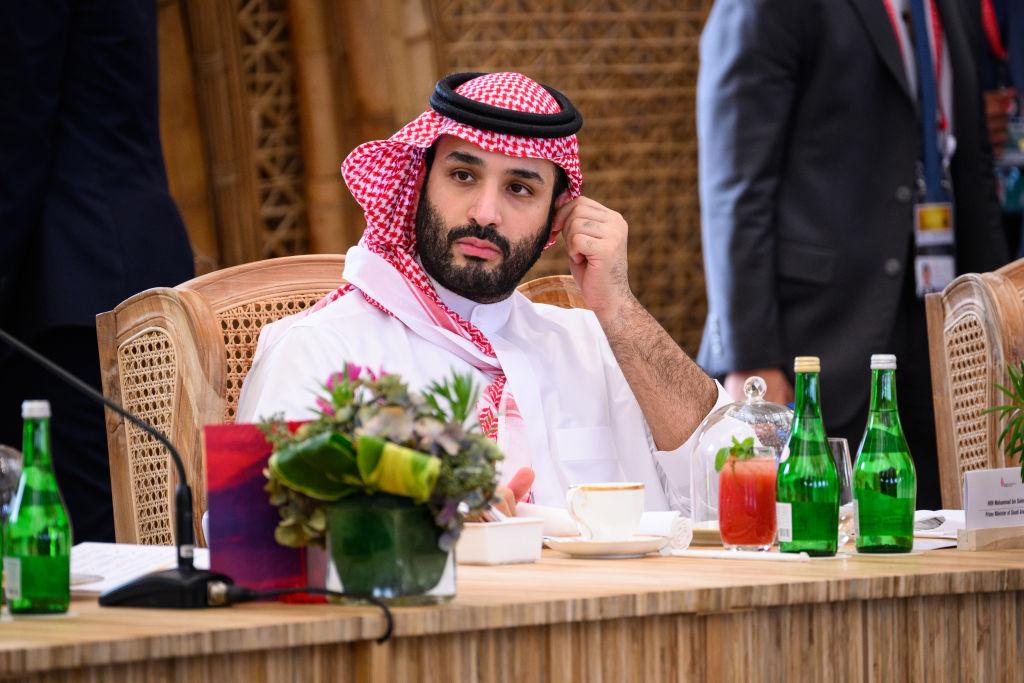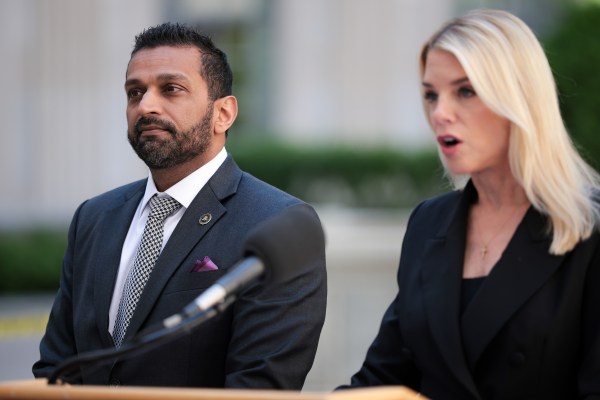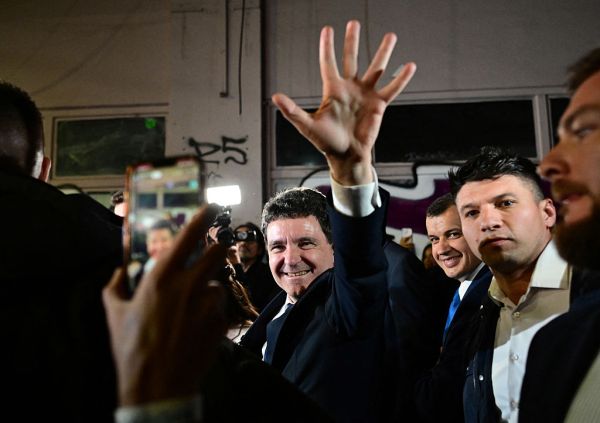TEL AVIV, Israel—An unprecedented attack by Hamas and allied Palestinian groups has left some 1,300 Israelis dead, most of them civilians, while an estimated 130 others remain in terrorist captivity. More than 950 Palestinians are also reported to have been killed as Israel mounts its defense, and a looming ground operation in Gaza threatens to multiply the human toll for both sides.
In addition to drawing its enemy into a costly and unwanted war, Hamas’ attack appears to have achieved another of its key objectives: derailing U.S.-brokered peace talks between Israel and Saudi Arabia. A Saudi Foreign Ministry statement following the terrorist onslaught blamed “the continued occupation, the deprivation of the Palestinian people of their legitimate rights, and the repetition of systematic provocations against its sanctities.” Other sources close to Riyadh confirmed to the New York Times that the negotiations were “on hold” in light of the conflict.
But both Israel and Saudi Arabia’s long-term motivations for achieving peace remain, and neither country has fully relinquished its commitment to the cause even as tensions in the region flare. So while Hamas may have disrupted Israel’s attempts at fence-mending with the broader Muslim world in the immediate term, it likely also solidified the Palestinians’ exclusion from any future deal to the great long-term detriment of the very people it purports to represent.
The surprise assault from Gaza last weekend began as Saudi Arabia and Israel appeared to be on the precipice of hallmark agreement. “Everyday we get closer,” Saudi Crown Prince Mohammed bin Salman (MBS), the country’s de facto sovereign, said of the deal in an interview with Fox News last month. But instead of handing President Joe Biden his crowning foreign policy achievement ahead of the 2024 election, the Middle East erupted into war.
The peace talks may be at least partly to blame. Interviews with Palestinians across the political spectrum, conducted in the West Bank prior to the Gaza attack, revealed deep discontent with Saudi Arabia’s olive branch, including veiled threats of violence if normalization moved forward.
“[Normalization is] not new, and it will not affect our struggle. It will never affect our demands for freedom or our struggle for liberation for one minute,” Dr. Mustafa Barghouti, secretary general of the Palestinian National Initiative and a sympathizer with armed groups, told The Dispatch last month. “Where is resistance? It’s not just in Nablus and Jenin,” he added, referring to refugee camps in the West Bank known for their terrorist activity. “Resistance is everywhere.”
“There are Arab armies who are standing on the borders ready to fight Israel,” Barghouti added, “and now, because of normalization, they’ve dispatched their armies.” Barghouti has since taken to international media channels to equivocate about the recent massacre of Israelis.
Other armed groups may soon join the Gaza terrorists in their quest to sabotage diplomacy by force. Iranian-backed Iraqi and Yemen militants have threatened to get involved in the fight, including by attacking American troops in the region. And Lebanese Hezbollah, which like Hamas is a recipient of Iranian support, claimed responsibility for mortar and rocket fire into northern Israel on Monday and a missile strike on Wednesday. “They’re armed to the teeth by Iran,” Joe Truzman, a Foundation for Defense of Democracies analyst focused on Hezbollah and Palestinian terror groups, told The Dispatch. “I just don’t know to what extent they are willing to get into this fight. Are we talking hundreds or thousands of rockets? Or something like we saw earlier, with some mortar fire toward military bases? I can’t tell you, but it’s very concerning.”
“Hamas is an opponent of normalization. Hezbollah is an opponent of normalization. Iran is an opponent of normalization,” State Department spokesman Matthew Miller told reporters on Tuesday. “And they seek to prevent normalization exactly through these terrorist attacks.”
U.S. officials are still investigating the degree to which Iran was involved in the initial attack, but the Wall Street Journal released a detailed report on Sunday claiming that Iranian officials were deeply involved in planning—and later greenlighting—the offensive. The Washington Post corroborated the account on Monday, reporting that Iran had provided Hamas with training and tens of millions of dollars for weapons. Like the Palestinians, Tehran has a vested interest in disrupting peace between Israel and Saudi Arabia, whose diplomatic outreach is driven in no small part by a shared concern over Iranian regional aggression.
“Derailing the Israel-Saudi normalization train was almost certainly one of the main objectives of the October 7 Hamas pogrom and its backers in Iran and Hezbollah,” John Hannah, a senior fellow at the Jewish Institute for National Security of America and a former national security adviser to Vice President Dick Cheney, told The Dispatch. “An open declaration of amity between the world’s only Jewish state and the world’s most influential Arab and Muslim state poses a mortal threat to the very raison d’etre of both Iran’s Islamic Revolution and Hamas.”
This dynamic makes it all the more unlikely that Hamas’ attack will be a lasting impediment to normalization for the Saudis. Allowing it to be would essentially be giving Iran’s proxies a veto over the kingdom’s foreign policy-making.
But Riyadh’s reasons for seeking peace with Israel extend well beyond Iran. MBS’ Vision 2030—an ambitious project to transform Saudi Arabia into an economic powerhouse—lays out plans for “an integrated Middle East,” including cooperation with Israel, one of the most important economic players in the region. Saudi Arabia is also reportedly seeking a defense agreement with the United States, as well as help from Washington on its civilian nuclear program without constraints on its enrichment of uranium.
Given these drivers, it looked like Riyadh might ditch the Arab Peace Initiative prior to the outbreak of war last weekend. The 2002 Saudi-led initiative made political concessions to the Palestinians a precondition of normalizing ties with Israel, but Israeli media reported last month that Saudi Arabia was preparing to drop it in order to move forward with a deal. Israeli officials have maintained that establishing relations with their Arab neighbors will lay a vital foundation for reaching a lasting peace with the Palestinians going forward, while Saudi officials viewed normalization as a way to secure economic concessions that improve the Palestinian quality of life.
Those goals are in jeopardy with this latest round of fighting, but not dead. In response to the war in Gaza, the Saudi crown prince on Wednesday had his first call with Iranian President Ebrahim Raisi since their two countries resumed ties earlier this year. But for now, Riyadh’s engagement with Iran appears focused on de-escalation, not regional realignment toward Tehran, as it tries to prevent the outbreak of a broader conflict including Iran’s other proxies. While Iran’s account of the call accused the “Zionist regime” of war crimes, the Saudi read-out underscored MBS’ support for “efforts aimed at achieving comprehensive and fair peace that ensures the Palestinian people’s legitimate rights.” What wasn’t included in the statement, however, was an explicit condemnation of Israel or any mention of Palestinian statehood.
That omission was a good sign for those hoping still holding out for a normalization deal, as the prospect of a two-state solution has perhaps never been dimmer than in the aftermath of Saturday’s attack. For years to come, Israelis will likely look at Gaza as a cautionary tale in the dangers of ceding security interests in the name of Palestinian self-governance. Israel removed its forces and even Jewish settlers from Gaza in 2005, and, in 2007, Hamas launched its military takeover of the territory. It’s used the strip as a launching ground for terrorist attacks against Israelis ever since, with this weekend serving as the latest and most painful reminder that coexistence is a two-way street.
Gazan terrorists didn’t dash the hopes for Israeli-Arab peace last weekend. But they may’ve torpedoed the Palestinian people’s best chance of being a meaningful part of it.
Click here for more coverage of the war in Israel.








Please note that we at The Dispatch hold ourselves, our work, and our commenters to a higher standard than other places on the internet. We welcome comments that foster genuine debate or discussion—including comments critical of us or our work—but responses that include ad hominem attacks on fellow Dispatch members or are intended to stoke fear and anger may be moderated.
With your membership, you only have the ability to comment on The Morning Dispatch articles. Consider upgrading to join the conversation everywhere.